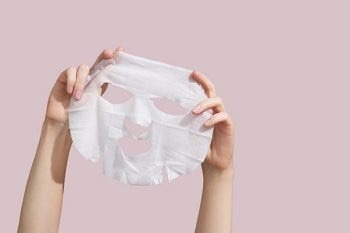Starting a new year, many people pledge to enact self-care routines that improve their appearance. And facial sheet masks soaked in skin care ingredients provide an easy way to do this. However, these wet masks and their waterproof packaging often contain plastics and preservatives. Now, a study in ACS Applied Materials & Interfaces reports a dry-packaged hydrating facial mask that is made of biobased and sustainable materials.
 Researchers have designed a biobased facial sheet mask, similar to this one, that moisturizes skin even though the sheet starts dry. LeviaUA/Shutterstock.com
Researchers have designed a biobased facial sheet mask, similar to this one, that moisturizes skin even though the sheet starts dry. LeviaUA/Shutterstock.com
Consumers in the beauty industry are increasingly concerned about the sustainability and sourcing of personal care items, in terms of both products’ ingredients and packaging. Facial sheet masks are popular cosmetic products advertised to benefit and enhance the skin. But they are typically made with plastic backing fabrics and are packaged with wet ingredients, requiring preservatives and disposable water-tight pouches. A more environmentally friendly option would be to package the facial masks dry. So, Jinlain Hu and coworkers aimed to design a facial sheet mask with biobased materials that could be enveloped in paper and later activated to deliver moisture and nutrients.
The researchers developed a facial mask with a sheet of plant-based polylactic acid (PLA), which could repel water, and they coated it in a layer of gelatin mixed with hyaluronic acid and green tea extract. They deposited the top layer as either tiny fibers or microspheres, using electrospinning or electrospray, respectively, and tested how well the masks could transfer moisture. They found:
- Water droplets did not pass through the masks without skin contact, regardless of which side a water droplet was placed on.
- Contact with skin initiated one-way water transport from PLA to gelatin to skin, but only for masks coated with gelatin-based microspheres.
- Placing the mask on moistened, rather than dry, skin improved water delivery through the mask.
Finally, the team investigated how its mask’s ingredients impacted mouse cells as a proxy for reactions on skin. Fewer cells showed signals of aging when grown on the mask compared with cells grown in control conditions; the researchers attribute this to the antioxidant properties of the green tea extracts. The team says the beneficial properties of the natural ingredients and the one-way moisture-delivery design make this mask a promising alternative with a lesser environmental impact compared to traditional, wet-packed products.